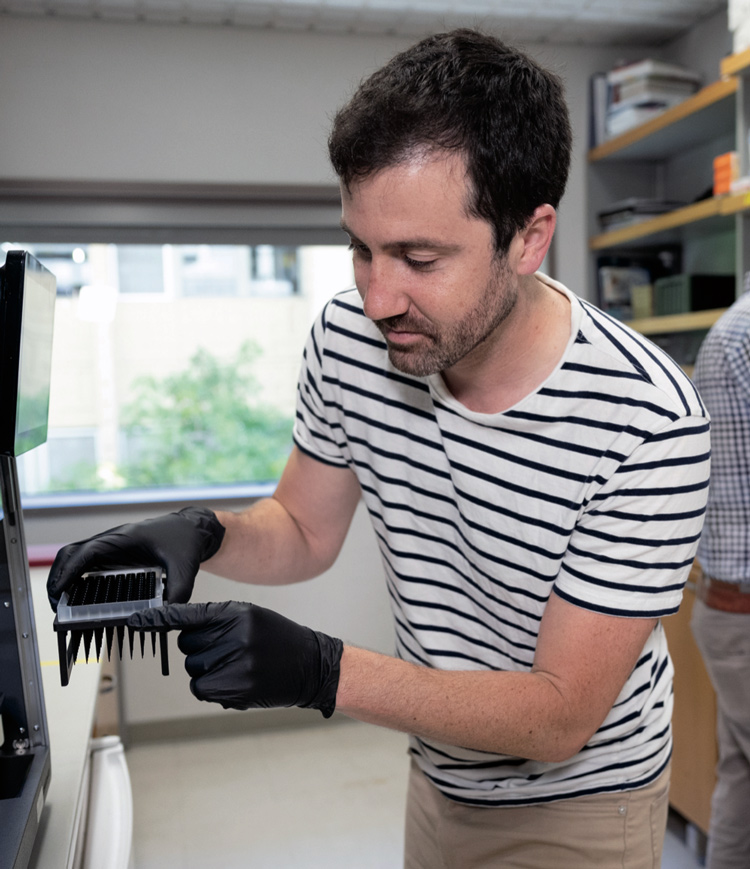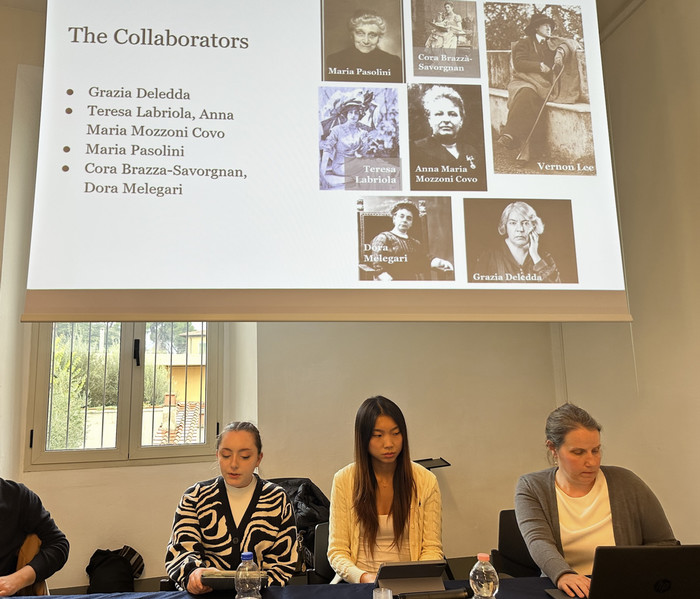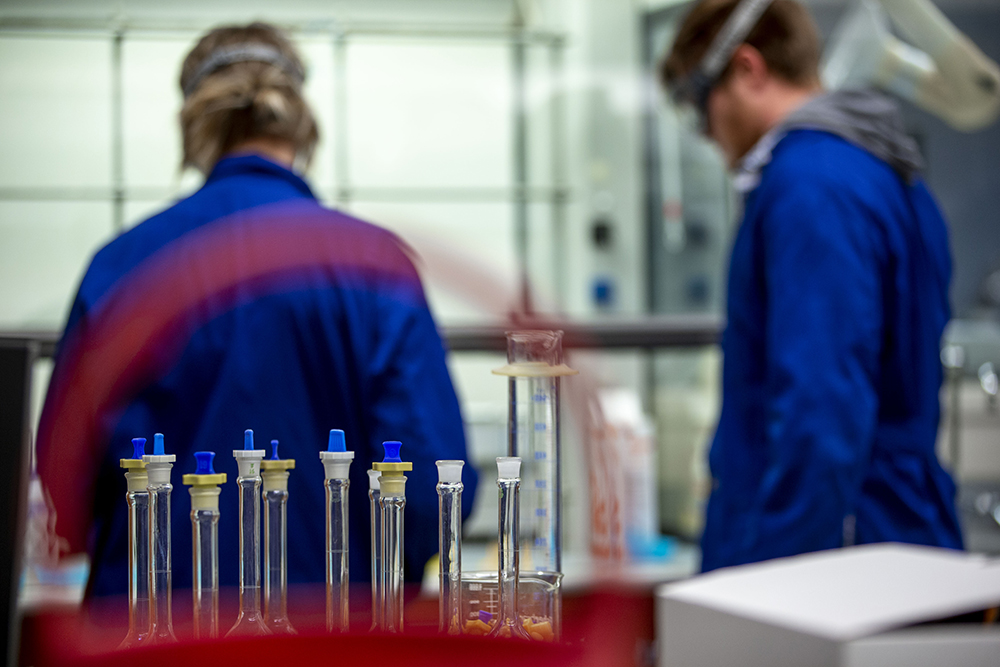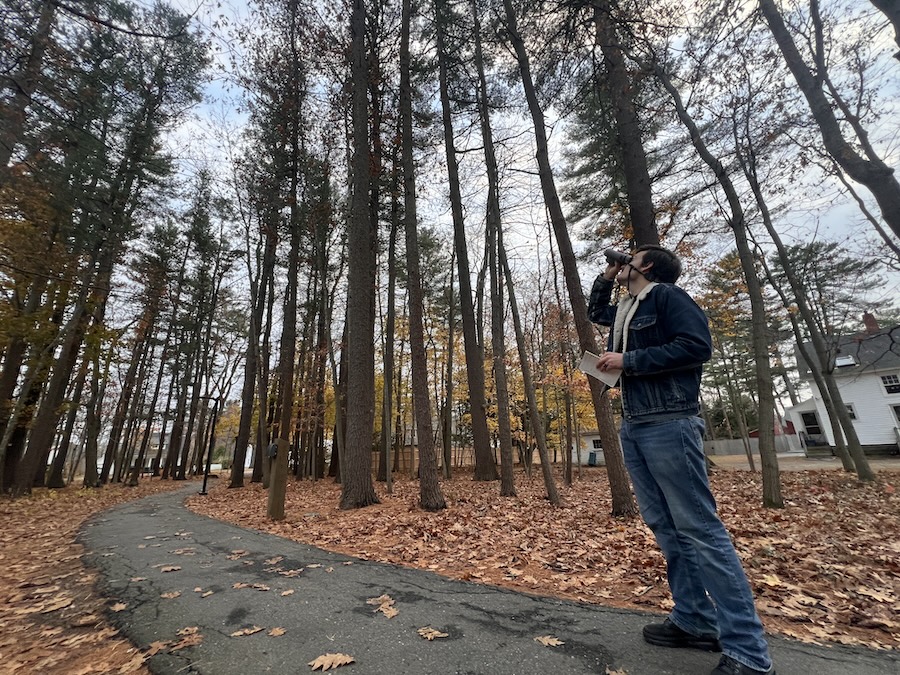Curious Science
By Bowdoin MagazineIn a biology career driven more by the techniques and ways of thinking in science than a narrow focus of research, Jacob Blum ’13 has found satisfying work connecting and communicating.

What are you working on?
I just finished up at Stanford Catalyst—a year-and-a-half-long incubator program for biotech startup companies. Another postdoc and I and a few professors have been working on an idea that we plan to spin out into a company in the next year or so. The project I'm working on right now is all about designing human cells that do very specific things within the body. We're focused on cell engineering—making neurons more resilient to disease or helping train the immune system to attack cancers. We're trying to make a platform that allows cells to be made to do what you want them to do in the body to cure disease. That’s the general idea.
My PhD focused on understanding the molecular basis for neurodegenerative disease, and this new chapter is still in the realm of therapeutics, still trying to cure disease, but from a slightly different perspective and using a slightly different technology. That's what I've been up to since I graduated from my PhD program, all the while kind of still wrapping up the research from my PhD.
Wow, that would be a very big deal.
Yeah, it's a big-picture idea but it doesn’t come in a vacuum—cell engineering and cell therapies have been under development for the last twenty or thirty years in academia and in the pharmaceutical industry, where people have moved closer to making cells that do something useful in the body in a very specific way.
There are drugs that have been approved that are effectively cells that have been programmed to target cancers as a foreign pathogen, called CAR-T therapy. That was kind of the big “aha” moment for the medical world and the pharma industry, where people realized, “If you can train cells to go and attack cancer, that's a much better way than just nonspecifically killing all dividing cells in the body,” like chemotherapy does. So it's a different angle and uses cells as the substrate for medicine, a slightly different angle into problems that people have been trying to solve for a long time.
There are lots more complications and nuance that I can’t go into with this format, but generally we see the future as being one where you're trying to be more specific about what you tell cells to do in the body to cure disease. We want to be on the engineering side of that, being able to figure out how exactly to tell cells what to do. In how exactly that logic and process works, the analogy could be in trying to build a design language for cells. In computational systems with computers, you have coding, and you have computer science, and you have all this architecture built up over the years, and eventually you have computers. In biology, we don’t fully understand the logic that controls cells, so you need to develop your own language for how to communicate with them and tell them what to do.
Does it seem promising?
Yeah, our early results are extremely promising from an academic perspective. For the company side of things it is still early days, though. We just completed the Stanford Catalyst Program, which gave us funding to build out this idea and develop it. The plan is to leave Stanford in the next year and raise outside funding to further accelerate our development process.
How does what you're doing differ from something like gene therapy?
Gene therapy is more of a delivery technology. There's a certain set of conditions that are genetic conditions—you have a mutation in a gene that causes a disease. If you replace the gene, you cure the disease. So there is no real unresolved biology, except: how do we get in there and replace the deleterious gene?
But for most diseases that relationship between genes and dysfunction is imperfect. For instance, there are various mutations you can inherit that predispose you to certain types of cancers, but they don't say that you will necessarily get that cancer. So even if you corrected those mutations, it wouldn't necessarily prevent you from getting that cancer. For Alzheimer's disease, similarly, there are factors that increase your risk, but they don't predict whether you'll get Alzheimer's definitively. Most scientific research in these fields relates to understanding the basic biology of the disease, and then testing to see whether therapeutic interventions can help. So all of that is one step upstream of gene therapy.
Going back to your ALS research, what were you specifically working on? How is that different from what you're doing now?
What I was working on is trying to understand the “who,” “what,” and “why” of ALS. Who are the affected cells (motor neurons), what types of stress are they experiencing, and why are they particularly affected. ALS is a neurological disease that causes lower motor neurons of the spinal cord and upper motor neurons of the brain to malfunction and die. And at least historically has been thought of as leaving the rest of the brain relatively preserved. It’s selective death of these neurons that control your movement.
And that type of cell is the motor neuron. My project was trying to figure out what genes do motor neurons express in normal times, and then how, in an ALS mouse model, do motor neurons respond to the threats and insults caused by these ALS-related genes? And how does that change their normal baseline function and how they do their job of communicating signals between the brain and spinal cord and the muscles?
It seems that ALS research is poised for kind of a breakthrough. What does that look like, and is that real?
It's hard to promise breakthroughs, especially with neurological conditions, because it's just an inherently difficult problem. In the case of cancer, the root cause is that there's some foreign mass in your body, which is constituted of your own cells. But there's something in your body that's growing that shouldn't be, so the job is just to kill it.
And killing stuff is relatively easy, generally. It's hard to do it specifically, and there are all sorts of caveats. But in neurological conditions, the problem is neurons in your brain and spinal cord don't get replaced over time. So you have a certain set of neurons from adolescence, and those have to last you until you're 120 years old. In neurological conditions, they die prematurely. In ALS, motor neurons die prematurely. If you want to cure ALS, you're tasked with trying to prevent death, which is just a very hard thing.
So, that's the big caveat. People think, “Oh, why haven't we cured Alzheimer's? Why haven't we cured ALS?” and it's a fundamentally different problem. That being said, there's a lot of excitement in ALS research right now. Mostly, there have been a couple of interesting developments. Fifteen percent of ALS cases are not sporadic but familial inherited forms of ALS. Those have interesting gene therapies in the clinic, where people are trying to correct those mutations either genetically or correct them through some complicated molecular biology functionally.
And those seem very promising. There are lots of other shots on goal, and we have lots of things that could end up panning out really well. I think as we learn more and more about what motor neurons normally look like, what the pathological process of ALS does to motor neurons, we can figure out how to intervene in that process in a way that prevents them from dying and retains their function. The more and more we learn about that underlying etiology, the better we're going to be at trying to figure out interventions.
The motor neurons govern all motion, even including things like your eyes, right? Isn't that one of the functions that people tend to lose last?
Yeah, the eyes are controlled by oculomotor neurons, which are resistant to degeneration. They actually reside in the brainstem, which is part of the brain, whereas other motor neurons reside in the spinal cord. So, they have many functional and physical differences from motor neurons that are susceptible in ALS. But it is a very interesting observation, and researchers have tried to learn more about neuronal susceptibility by comparing oculomotor neurons with other motor neurons. Part of the issue with interpretation is that there are so many differences between those cell populations, which makes it hard to interpret why one population is resistant to disease and the other is not.
The follow-up work to my main PhD project goes into this question of differential neuronal susceptibility. We use an ALS mouse model to decouple which motor neurons survive in the context of ALS, and then, what are the gene expression changes in those surviving motor neurons that distinguish them from motor neurons that would otherwise die. So trying to tease apart this selective vulnerability—why one motor neuron or why one cell type in a neurological condition dies and the other one doesn't.
It's kind of the holy grail of these neurological research areas, because if you can figure out what makes the one subpopulation so it just can't die, then you're many steps closer to solving the actual underlying problem.
Many scientists or researchers will spend their entire career dealing with one particular problem, and it strikes me that you are not one of those people. What drives you?
The throughline of my career is that I work on problems that arouse my curiosity and get me excited! Rather than focus on a specific disease or cell type, I am guided by curiosity and an approach to scientific hypotheses that I started honing at Bowdoin in Jack Bateman’s lab. I worked with Jack studying this interesting phenomenon that only really happens in fruit flies, where you get gene activation from one chromosome to another chromosome. That experience gave me a toolset and way to approach scientific problems that I during my Fulbright in Rome.
I've always wanted to do a little bit of everything. As I've moved through my career, I've figured out which types of techniques and which types of research questions are more amenable to that style of science. And that's probably what brought me to where I currently am—the most general possible question, which is trying to make a platform that can generically program cells across different subfields and across different cell types.
I used to think it was maybe a weakness that I didn't want to specify, and as I've gone along through my career, I've realized that it's actually a unique strength to be able to communicate across fields. I think I can talk to a lot of different people who have different interesting ideas, and I like being that center point that kind of connects them all.
Going back even further, what drew you to Bowdoin? Tell me about your journey of deciding to come here.
I haven't thought about this in a very long time. [Laughter] My father was a professor, and I was born near Dartmouth, lived in New Hampshire when I was young. And then we moved to Ann Arbor, Michigan.
I grew up in the shadow of University of Michigan—like, if you were a high-achiever at my high school, you would go there. And maybe this comes back to the same generalist impulse, but I saw, you know, if I wanted to do x, y, or z at a big public university, there was going to be a strong pressure for me to subspecialize very quickly and not deviate too far from whatever thing I ended up picking. And I very much did not want to do that.
I was interested in taking the broadest diversity of classes and was super interested in philosophy and in literature, very interested in film and very interested in science, and didn't really know what I wanted to do. I only knew I wanted to do everything. [Laughter] Bowdoin seemed like the type of place where that was not only possible, but actively encouraged. That was probably the main reason. The secondary reason was that I just loved Italian. I took Italian in high school, in a college class at the university, and really, really, really liked it. And the Bowdoin Italian department is amazing and was amazing at the time. Italian definitely drew me and kept me happy at Bowdoin. So that was a big reason. And then the last reason that Bowdoin was in my framework was because one of my dad's former grad students was a Bowdoin grad from around 2000, and I interacted with him when I was little and he always just talked about how amazing Bowdoin was and how he found himself, and just had a great time. So lots of little things that all pointed in Bowdoin’s direction.
What inspires you?
If I'm being fully honest, I think I have day-to-day inspirations, kind of month-to-month inspirations, and then more year-scale inspirations. Ideally, all of those things are aligned. So the one thing I really liked about science, and specifically science that's trying to cure horrible diseases, is on the year scale, like, the long arc of the career. I feel like if I work as hard as I possibly can on making discoveries—even without going out every day and seeing patients, I'm contributing to the long arc of progress that's going to eventually help people.
In terms of the month-to-month and day-to-day, what inspires me is the relatively mundane (but exciting to me!) process of innovation and optimization. I really like solving for inefficiencies in research. If there's a low throughput way of doing something or if there's some process that could be automated or there's something that I see as an antiquated way of approaching a problem that you could apply a new technology to, I feel very inspired by implementing that and kind of developing that into a new technology.
I think that drives a lot of what I've done, and a lot of what I probably will do in the future. And then, the other thing is just being around smart, interesting people, and discussing interesting scientific problems and bouncing ideas back and forth. And trying to figure out some combination of what's the cleverest and most time-efficient way of solving an interesting problem.
I think just getting that diversity of perspective and diversity of techniques in a collaborative setting where you get a window into how another person can look at the exact same problem that you're trying to solve and think about solving it in such a different and unique way. That is what builds scientific intuition for how to solve problems efficiently, builds a corpus of knowledge, and just a better understanding for how people think and how people reason. And I think that's the most fun part about science.
You mentioned efficiency, and of course science is about repetition and controls and all these things that are very exacting. Is there a way that AI is going to be part of your future work, do you think?
I certainly hope so. [Laughs] It's a large piece of the company idea that we're working on now. We think there is a very important future in AI-based experimental design and execution that will help us close the loop and reach scientific conclusions in the most efficient way possible.
For the foreseeable future there will be humans involved, but in the world of genomics you get an appreciation for the amount of data you can rapidly generate about biological systems. Going from that amount of information down to a set of ‘main conclusions’ that you can draw from an experiment is an extraordinarily difficult process that computation is very good at!
Interesting. Other than that, which is a very big challenge specific to biology, what are the challenges for researchers? What obstacles are there?
When you come up with a clever experiment or a cool idea or a research project, the delta between that and the actual nitty-gritty execution of that idea is the biggest challenge in biology. So, as scientist trainees like PhD students and postdoctoral fellows, you're almost always on both ends of the planning-and-execution process. You come up with an interesting hypothesis and way to test it, but then you also have to literally put your hands in the system and manipulate biology to do the thing that you care about. I would say that, generally, the most difficult thing is just doing the actual work and maintaining the level of consistency and expertise across subdomains to execute interesting projects.
It is really one of the fields where you're making the sausages—you know, you're at the front of the store, you're selling the sausages, you're in the back of the store and you're making sausages. [Laughter] And you're writing the advertising copy in the newspaper telling everyone about how great the sausages are! It's an end-to-end type of job where you have to be good at a lot of things and you have to have a strong work ethic, and just be willing to constantly feel dumb. And there's always complications and it's always messy and it always kind of makes you feel like you don't know what you're doing. And that's kind of the sign that you're doing the right thing. Sometimes. Sometimes you just don't know what you're doing [laughter].
It sounds like you had a good experience at Bowdoin, and you were pretty clear-eyed, coming in, about what you wanted. But if you were to talk to somebody who was like you when you met your dad's assistant, what kinds of things would you tell this person to do? How would you tell them to make the most of their college education?
I would tell them to never be afraid of any class or any fields when you're in college. It's a time where you can learn about anything you're interested in and just apply yourself and be curious. I had a lot of influential classes at Bowdoin, but the ones I think back to most were the ones that were kind of curveballs I signed up for on a whim. All of the classes that diverged from my main career path are the ones that I remember best and think of fondly. I think the special thing about liberal arts is that type of meandering path is encouraged.
That reminds me, were you a DJ at WBOR? Does music still play a role in your life?
I have a two-and-a-half-year-old, so I listen to all the classic Raffi songs now, every day [Laughter]. At work, on days where you just have to grind through and be efficient and stay super focused, music plays a huge role. A lot of the music that I listen to takes me back to Bowdoin. Like, whenever I listen to the Shins, there's one specific album that makes me think of being in Jack's lab in Bowdoin over the summer, passaging flies with other undergrads and with Jack. And it just brings me right back there.

This story first appeared in the Fall 2024 issue of Bowdoin Magazine. Manage your subscription and see other stories from the magazine on the Bowdoin Magazine website.



